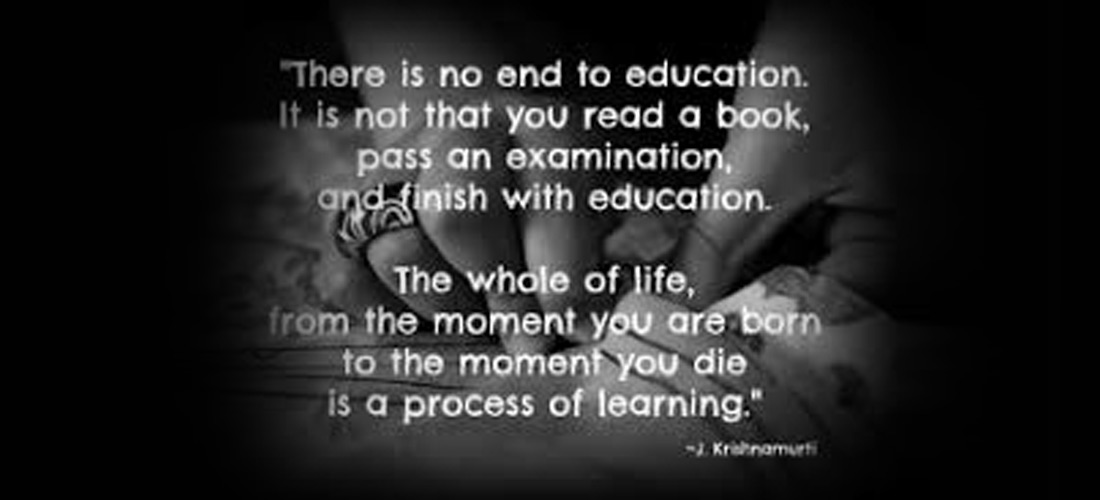Taking back the Internet...

Lifelong Learning

Since the digital technology revolution, there has been an increasing trend toward a “reinvent-the-wheel” mindset, which has given lifelong learning a bad name. Probably, most of these tendencies result from the ability of digital technology to make possible an apparently infinite array of tweaks and customization to existing tools. For instance, many people remember early versions of the Microsoft™ Word™ application. Initially, it provided basic but very effective and flexible tools for writers. Most people were excited to have this new invention, dubbed “word processing software,” to help with writing tasks. The formerly intimidating and arduous task of typing error-free documents on a steel typewriter was transformed into an exciting and inspirational tool for authors who were all too happy to take advantage of the newly developed possibility of easy error correction, copy and paste, and the ability to move paragraphs around without the need to re-type everything from scratch every time a major edit was required.
Now, Microsoft™ Word™ has been redeveloped and redesigned repeatedly. Annual updates and changes to layout, new functions, and an overabundance of associated tools available on the Internet, have enhanced this software with complexity that most people probably will never use. Nonetheless, these development efforts have likely resulted in a bloated software design department at Microsoft Corporation—countless employees are probably paid fairly substantial salaries to tweak and alter and update existing programs with newer and increasingly complex updates that do not really add anything to the basic functionality of the original product.
Thus, technology has created a pseudo-industry. Social media applications, cellular phone applications, gadgets, buzzers, bells, alarms, cameras, light and sound detectors, and all manner of tools for documenting, monitoring, and analyzing the activity of the increasingly duplicative business of overly-technological departments of public and private organizations everywhere are continually reinvented and redesigned on an ongoing basis. Unfortunately, the work these tools are designed to help people accomplish more effectively has been neglected, and the redesign of software and “mobile apps” has become the substantial majority of most companies’ personnel and research and development budgets and training efforts.
But what have we gained as a result? When social media companies hire staff not to acquire new advertising accounts, but to develop more dazzling social media applications than the competition, they cease to provide the service they were originally created to provide. When Internet research companies spend their budgets on redesigning search engines and algorithms instead of researching whatever it is their founders set aside funding to investigate, they effectively abandon their mission and leave too many people stranded. When government agencies equipped with surveillance tools violate societal laws designed to protect privacy and ensure the prosperity of citizens and instead descend into deadly contests of illegal spying in an international for-profit competition to dominate the technology industry, we all lose.
Sadly, the education profession may be the most serious casualty in this war for technological supremacy. The term, “lifelong learning” is itself a living example of the failure following from the “reinvent-the-wheel” mindset. Too many schools appear obsessed with using high-tech advertising to “sell” prospective students on the value of so-called “lifelong learning.” Yet, there has never been a time in history when learning was not a lifelong venture. How many times have you heard the saying, “You learn something new every day”? It is not possible for anyone to make it through a lifetime without acquiring new knowledge throughout their life’s journey, and this is why the human species founded educational institutes so long ago.
Unfortunately, although in the past, there was scarcely anyone who would not have jumped at the chance to acquire a university education, societal changes have rendered most of what we do now unrecognizable and incomprehensible. The contemporary era of artificially generated environments, in which duplicative and pointless busy work has replaced traditional forms of human commerce, has embittered generations of people and turned them against the idea that “lifelong learning” is anything more than a euphemism for financial and intellectual slavery. The newly created educational management organizations may find it easier to train aspiring and ambitious young people to earn certificates in professional busy work than to honor the profession they have besmirched and soiled with this travesty of justice that only benefits the least deserving among us, but to do so is quite seriously a crime against humanity.
Luddite Online hopes that if you agree with this assessment you do not abandon your societal and human right to acquire a valuable and worthwhile education. But we also hope you enter into any such efforts with open eyes and a wariness for the self-serving bureaucracies that threaten to annihilate forever the priceless and timeless tradition of the liberal arts education.